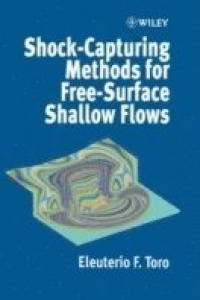
Liknande böcker
Shock-Capturing Methods for Free-Surface Shallow Flows
Bok av Eleuterio F. Toro
The first of its kind in the field, this title examines the use of modern, shock-capturing finite volume numerical methods, in the solution of partial differential equations associated with free-surface flows, which satisfy the shallow-water type assumption (including shallow water flows, dense gases and mixtures of materials as special samples). Starting with a general presentation of the governing equations for free-surface shallow flows and a discussion of their physical applicability, the book goes on to analyse the mathematical properties of the equations, in preparation for the presentation of the exact solution of the Riemann problem for wet and dry beds. After a general introduction to the finite volume approach, several chapters are then devoted to describing a variety of modern shock-capturing finite volume numerical methods, including Godunov methods of the upwind and centred type. Approximate Riemann solvers following various approaches are studied in detail as is their use in the Godunov approach for constructing low and high-order upwind TVD methods. Centred TVD schemes are also presented. Two chapters are then devoted to practical applications. The book finishes with an overview of potential practical applications of the methods studied, along with appropriate reference to sources of further information. Features include: Algorithmic and practical presentation of the methods Practical applications such as dam-break modelling and the study of bore reflection patterns in two space dimensions Sample computer programs and accompanying numerical software (details available at www.numeritek.com) The book is suitable for teaching postgraduate students of civil, mechanical, hydraulic and environmental engineering, meteorology, oceanography, fluid mechanics and applied mathematics. Selected portions of the material may also be useful in teaching final year undergraduate students in the above disciplines. The contents will also be of interest to research scientists and engineers in academia and research and consultancy laboratories.
Visa pris inkl. frakt Inkl. frakt
Shock-Capturing Methods for Free-Surface Shallow Flows
2111 kr
Finns i lager
Shock-Capturing Methods for Free-Surface Shallow Flows
3049 kr
Finns i lager
Shock-Capturing Methods for Free-Surface Shallow Flows
3128 kr
Finns i lager







